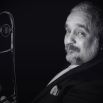Most music publications are celebrating the birthday of John Lennon today, what would have been his 74th. The Beatle is deserving of all praise but we just can't get behind an annual feature every year celebrating every random birthday. No, instead we're going to focus on another Jon that played a major role in '60s British rock music: Jon Entwistle.
October 9 marks what would have been the legendary bassist's 70th birthday, a much more even number. But it's not just that: The Who's "quiet" member redefined the instrument as both a rhythm and sometimes even lead instrument. Rolling Stone readers ranked him as the greatest bassist of all time and we don't have any good reason to disagree. Help us celebrate his birthday with a short list of his classic basslines:
"My Generation" (1965)
The lyrics of "My Generation" carry a revolutionary vibe but the bass guitar deserves its slice of the credit. Keith Moon may have been the rare super-drummer who despised solos but Entwistle wasn't against stepping out alone. Indeed, bass solos are usually best when kept as short and simple as possible, so it's as if The Who's rhythm man was setting the standard when he recorded his bit for "My Generation." Between that and the quick-fingered riff, the song is a justified classic for the instrument.
"Boris The Spider" (1966)
For every anthemic number like "My Generation" The Who had, the group also had relatively silly numbers such as "Boris The Spider." A number of individuals deserve credit for making "Generation" the classic it is but Entwistle deserves all the credit for the less heralded "Boris The Spider." Not only did he write the descending bassline—which perfectly describes the movements of a spider—he also wrote the lyrics and handled the deep bass and "creepy crawly" falsetto vocals as well. It's not a masterpiece of songwriting but it is a nice showcase for Entwistle's talents.
"Sparks" (1969)
Many bassists depend on instrumentals to get the credit they deserve, which is why Geddy Lee and Cliff Burton are always cited alongside "YYZ" and "Orion" respectively (we're not saying it's fair, we're just saying it's true). Entwistle clearly didn't fall into this category but that's not to say he couldn't stand out in an instrumental track, such as this number from Tommy. This song is a great showcase for the rhythm-machine that was the Moon/Entwistle combination...because we're not so hot on Pete Townshend's work for once and Roger Daltrey is obviously taking a break.
"Won't Get Fooled Again" (1971)
One of the major issues with being a bassist is being forced to stay toward the back during epic performances. After all, many would argue, that's the bass player's job. Entwistle proves during "Won't Get Fooled Again," one of the most epic Who performances, that he can fully deliver an engaging bass line without abandoning his role as the rhythmic core for the track. Flashing back to Lee and Burton, this is the kind of performance that would inspire their work for years to come: Distinctive AND effective.
"The Real Me" (1973)
This single off of Quadrophenia takes the traditional understanding of a rock band and reverses it: Townshend plays simple chords during the verses while Entwistle plays a melodic riff. It'd be like if a quarterback handed off to the tight end and the halfback led the blocking charge. "The Real Me" just demonstrates the flexibility of The Who and the possibilities that sprang from it. When the bassist and guitarist can work interchangeably, it opens the door for creativity, an advantage The Who certainly took advantage of.
"Trick of The Light" (1978)
This track from Who Are You demonstrated the possibility of the bass guitar to such an extent that many fans don't even realize the opening chords come from Entwistle's instrument and not Townshend's guitar. The trick is the eight-string bass and distortion used to accomplish a dense rhythmic wave generally expected from a guitar, inducing Townshend to describe the riff famously as a "musical Mac truck" because of its power. The song doubles as a tribute to Entwistle because he also wrote the lyrics describing male sexual anxiety.
© 2026 MusicTimes.com All rights reserved. Do not reproduce without permission.







